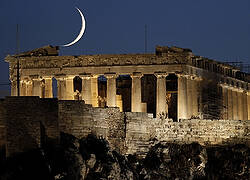The past few days, my students and I have been reviewing a passage on faith as part of a course entitled, "Foundations of Faith." The Foundations class is for ninth graders and is the first theology class our students take. It's a general overview of what it means to recognize a religious outlook or "faith stance" toward the world. The passage we've been discussing is from Catholicism in the Third Millenium, by Fr. Thomas Rausch, S.J., of Loyola Marymount University. I don't assign the book (which is pretty advanced for their age), but I do provide snippets for particular themes.
The passage we've been covering is from p. 19, Chapter 2. Fr. Rausch writes:
Religious faith is concerned with ultimate reality, with the ultimate questions we ask in our more reflective moments. Are we alone in this world, or is there a presence beyond it, a mystery transcending our comprehension, that reaches out to offer us compassion, companionship, and love? . . .
We have all experienced revelatory moments—gazing across a grassy prairie moving gently in the breeze, or perhaps on a beach watching the ocean break against the shore, or under the night sky with the Milky Way arching across the dark heavens like a brilliant road of stars—when we have felt our hearts expand and sensed that the universe is so much more than clouds of burning gas, swirling matter, transient life forms, and dying stars. In moments like these the universe appears benevolent; it seems personal, and we sense a mysterious presence at its heart. Parents have sensed it, rejoicing in a newborn child. Husbands and wives who have grown old together often glimpse it in their shared life. Poet Kathleen Norris finds it in the words of one of her students, a little girl who writes of the Dakota sky: “The sky is full of blue/and full of the mind of God.” In such moments of solitude, or joy, or communion, we know more than we are able to put into words; we sense the presence of the ultimate.
The "ultimate." This was the centerpiece of the past few days. As my students and I worked through that concept and what it means when applied to "reality" and "questions," I asked them, "What are some examples of 'ultimate questions'?" What are some ultimate questions that you carry right now?"
Here are some of their responses:
- Are we alone?
- If God is in all of us, are we all the same?
- Why are we here?
- Is there evil?
- What happens after death?
- What is death?
- How do you know what's true?
- How do you know what's right and what's wrong?
- What is existence?
Socrates, call your office. Impressive, right? I finished this week's classes excited at the year head, energized by the depth of their inquiries. My students are commencing the explorations that Pope John Paul II wrote about eloquently in Fides et Ratio:
[A] cursory glance at ancient history shows clearly how in different parts of the world, with their different cultures, there arise at the same time the fundamental questions which pervade human life: Who am I? Where have I come from and where am I going? Why is there evil? What is there after this life? These are the questions which we find in the sacred writings of Israel, as also in the Veda and the Avesta; we find them in the writings of Confucius and Lao-Tze, and in the preaching of Tirthankara and Buddha; they appear in the poetry of Homer and in the tragedies of Euripides and Sophocles, as they do in the philosophical writings of Plato and Aristotle. They are the questions which have their common source in the quest for meaning which has always compelled the human heart.
Raising these questions with students has renewed my gratefulness for the chance to teach at a Catholic school, for the vocation of guiding minds through questions that span centuries. Transitioning from the passivity of childhood to the more intentional mentality of adolescence, my students are beginning to piece together some kind of worldview and sense of self. They are starting to form the convictions that will determine what they will study, whom they will befriend, and whom or what they will worship. They are discovering what it means to think philosophically and theologically. And it is my great privilege, along with that of my colleagues, to join them along the way.








